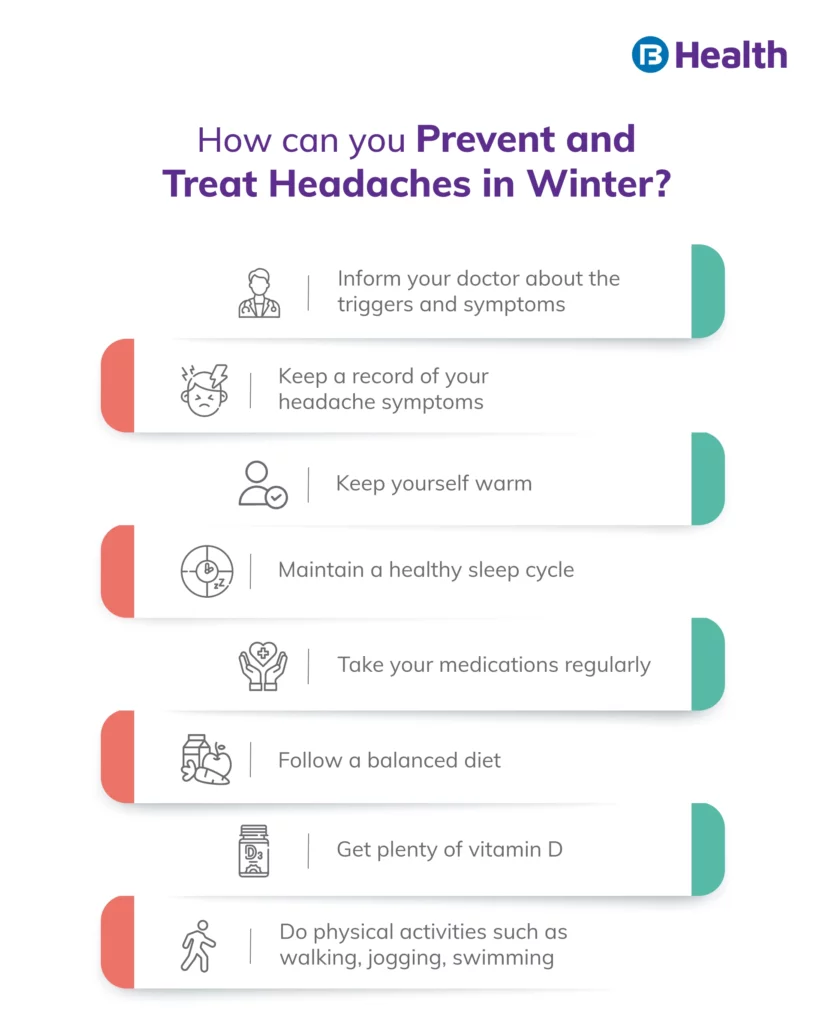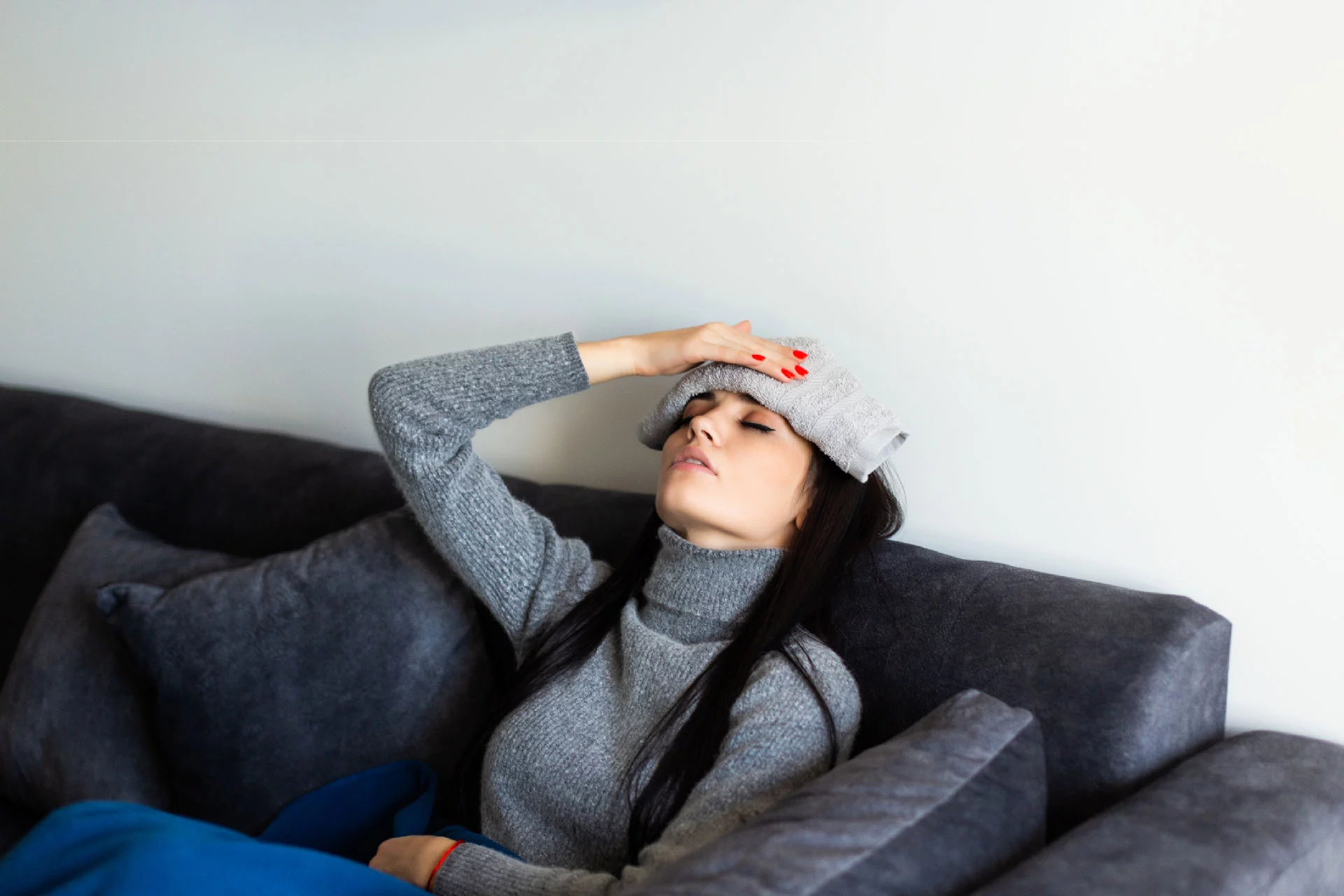General Health | 6 min read
Headaches in Winter: Top Causes and 8 Crucial Remedies
Medically reviewed by
Table of Content
Synopsis
Headaches in winter can appear as a bottleneck in your festive plans, so it is wise to protect yourself with suitable remedies. Discover how you can prevent yourself from headaches due to cold air.
Key Takeaways
- In winter, a large number of people suffer from headaches or migraines
- Headaches in winter can be annoying, but you can manage them with remedies
- Get yourself covered and stay hydrated to keep migraines at bay
Headaches in winter can be annoying, but it is a reality for a large number of people worldwide. Research has also shown the relationship between temperature drop and headaches [1]. So if you are one of the one billion individuals affected by migraines every year [2], it can get into your plans for winter holiday festivities accompanied by other conditions such as dry skin, flu, asthma and more. They usually come together without any warning and spoil your merrymaking.
Types of Headaches in Winter
It’s important to note that there are different types of headaches in winter that you can get. Here’s a look at them.
Cold-stimulus headache
If we don’t guard our heads, we can get an immediate headache from cold weather. That is known as a cold-stimulus headache.
Cluster headache
Though this is not directly linked to winter, it is a rare type of headache that impacts one in 1000 people and may peak during the cold weather. Researchers are yet to identify the exact reason for cluster headaches. However, it is known that it may affect one of your facial nerves and lead to chronic pain around one of your eyes. The severity of such headaches in winter may make you squirm in pain during attacks. Unlike migraines, these bouts of headaches from cold weather do not last long. Moreover, these headaches may disappear for years and then return again.
Other common triggers of headaches in winter include changes in sleep patterns, dehydration, diet, reduced exposure to sunlight, excess pollen in the air leading to allergic rhinitis, carbon monoxide poisoning from room heaters, and more. Read on to learn more about winter headaches and how you can keep them at bay.

Causes for Headaches Due to Cold Weather
If you are experiencing headaches in winter, there may be two factors responsible for it.
Cold weather reduces the barometric pressure
Remember what you read in science about the relationship between air pressure and weather? The colder the temperature gets, the lower the air pressure becomes. As a result, you experience different air pressures indoors and outdoors as your rooms are usually warmer than outside. This situation can lead to cold weather headaches in two ways:
Sinus headache
Sinus headache is usually accompanied by severe ear pain. This symptom is caused by the swelling when your body acclimatises to the air pressure change. If you have been on a plane, you may have similar experiences after the plane takes off.Migraines
With changes in the temperature and air pressure, your blood vessels may dilate, affecting the blood flow to your brain. This is when you experience severe headaches, and such episodes are known as migraines.
Humidity drops
As the weather gradually becomes dry, it affects our skin and bodily systems. As the mucus in the sinuses also becomes thick and heavy, it becomes challenging for cilia to help the body get rid of it through the nose or mouth. This situation can lead to sinus infections and sinus headaches.
Additional Read: Common Cold CausesTreatment for Headaches in Winter
You can adhere to the following checklist when it comes to preventing or treating headaches in cold weather:
Let your doctor know about the triggers and symptoms
Only doctors can help you identify the exact cause of the headaches in winter. Discuss the triggers and symptoms with them so they can tell you whether it’s a sinus headache, cluster headache, or usual cold-stimulus headache.
Discuss the effectiveness of the prescribed or OTC drugs you are using
It is important for the doctors to know whether the medicines they have recommended are leading you to wellness. It is also crucial for you to inform them whether you are taking any over-the-counter drugs to reduce headaches and whether they are helping or not. Such conversations will help your doctor improve the treatment plan from time to time.
Maintain a headache or migraine diary
Take notes of the dates and times when you are getting headaches so that it helps your doctor identify a pattern and make a proper diagnosis.
Additional Read: COVID-19 vs Flu
Remedies for Headache Due to Cold
Keep yourself warm
Keeping yourself warm is a must to be safe from headaches in winter. Remember, exposure to chilly weather can spike migraine, so make wise use of your winter outfits.
Don’t consume foods containing monosodium glutamate (MSG)
MSG is in the list of causative substances of headache prepared by the International Classification of Headache Disorders 3rd edition (ICHD-III beta) [3]. However, note that there is no substantial research on the link between MSG and headaches. Despite that, it is wise to avoid MSG-containing foods to be safe and keep headaches in winter at bay.
Maintain a healthy sleep cycle
Though the reduced daytime in the winter can affect your sleep cycle, you need to maintain a planned sleep schedule. A healthy and continuous sleep cycle can prevent headaches in winter and boost your other health parameters.
Eat healthily, eat on time
While it is crucial to maintain a healthy and balanced diet, it is also wise to have your meals on time. Apart from heavy meals, make sure to have light snacks from time to time. Note that skipping your meals can be a trigger for headaches in winter and several other health issues.
Keep yourself hydrated
Make sure to drink lots of water and fruit juices to prevent dehydration. However, do not consume them chilled, as that can immediately lead to a cold and a headache.
Get sufficient vitamin D
People suffering from migraine usually have a low amount of vitamin D. As per a 2018 study, 94.9% of the subjects with migraine were deficient in vitamin D [4]. So, if you are having headaches in winter, make sure to spend some extra time in sunlight as it is a source of vitamin D. You can also add foods like soya milk, oatmeal, orange juice, cereals and more to your diet to make it rich in vitamin D.
Be as active as you can
It is wise to be on physical movements like walking, jogging, and other simple exercises. As per a recent study, routine exercises can benefit cases of depression as well as headaches in winter [5].
Take your medications wisely
Whether you are on prescribed medications or taking OTC drugs, make sure to have them regularly and on time. Don’t miss or repeat your doses. In case you have any concerns about your symptoms or doses, get in touch with your doctor immediately.
Conclusion
If you are suffering from migraine or headaches in winter, you can easily avail homeopathic medicines for migraine. For another choice, you can go for migraine treatment in ayurveda. With so many options, you can go either way and conveniently manage your headache due to cold weather. For a heart-to-heart discussion, get a doctor consultation on Bajaj Finserv Health, and talk with a general physician on any other specialist registered on the platform. To say bye-bye to headaches in winter, start protecting yourself from the cold right away!
FAQs
Why do I get headaches in winter?
With the drop in temperature in winter, the air pressure drops too. This change of pressure, coupled with a drop in humidity, impacts our ears and sinus, leading to chronic headaches.
How long do winter headaches last?
Usually, a headache in cold weather lasts between 15 minutes to 3 hours.
References
- https://link.springer.com/article/10.1186/s10194-015-0533-5
- https://www.ncbi.nlm.nih.gov/pmc/articles/PMC8904749/
- https://www.ncbi.nlm.nih.gov/pmc/articles/PMC7019347/#:~:text=The%20majority%20(94.9%25)%20of,deficiency%20than%20those%20without%20deficiency.&text=Serum%20vitamin%20D%20levels%20were,compared%20with%20the%20control%20group.
- https://www.ncbi.nlm.nih.gov/pmc/articles/PMC7019347/#:~:text=The%20majority%20(94.9%25)%20of,deficiency%20than%20those%20without%20deficiency.&text=Serum%20vitamin%20D%20levels%20were,compared%20with%20the%20control%20group.
- https://europepmc.org/article/med/24921618
Disclaimer
Please note that this article is solely meant for informational purposes and Bajaj Finserv Health Limited (“BFHL”) does not shoulder any responsibility of the views/advice/information expressed/given by the writer/reviewer/originator. This article should not be considered as a substitute for any medical advice, diagnosis or treatment. Always consult with your trusted physician/qualified healthcare professional to evaluate your medical condition. The above article has been reviewed by a qualified doctor and BFHL is not responsible for any damages for any information or services provided by any third party.





